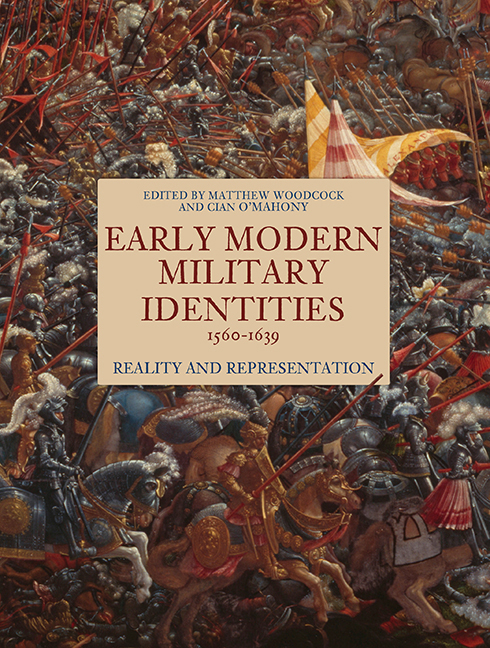Book contents
- Frontmatter
- Contents
- List of Illustrations
- List of Contributors
- Acknowledgments
- List of Abbreviations
- Introduction
- Part I Models of Military Identity
- Part II Military Identities in Early odern Ireland
- 5 The Clergy and the Military in Early Modern Ireland
- 6 ‘Trust, Desert, Power and skill to serve’: The Old English and Military Identities in Late Elizabethan Ireland
- 7 Artifice in Ormonius: Why a Renaissance Latin Epic Falsified the Military History of a Tudor Irish General
- 8 Irish Savage and English Butcher: Military Identities and Tyrone's Rebellion, 1593-1603
- 9 A print in my body of this day's service’: Finding Meaning in Wounding During and After the Nine Years War
- Part III Staging Military Identities
- Afterword: The Way Ahead
- Bibliography
- Index
6 - ‘Trust, Desert, Power and skill to serve’: The Old English and Military Identities in Late Elizabethan Ireland
from Part II - Military Identities in Early odern Ireland
Published online by Cambridge University Press: 14 September 2019
- Frontmatter
- Contents
- List of Illustrations
- List of Contributors
- Acknowledgments
- List of Abbreviations
- Introduction
- Part I Models of Military Identity
- Part II Military Identities in Early odern Ireland
- 5 The Clergy and the Military in Early Modern Ireland
- 6 ‘Trust, Desert, Power and skill to serve’: The Old English and Military Identities in Late Elizabethan Ireland
- 7 Artifice in Ormonius: Why a Renaissance Latin Epic Falsified the Military History of a Tudor Irish General
- 8 Irish Savage and English Butcher: Military Identities and Tyrone's Rebellion, 1593-1603
- 9 A print in my body of this day's service’: Finding Meaning in Wounding During and After the Nine Years War
- Part III Staging Military Identities
- Afterword: The Way Ahead
- Bibliography
- Index
Summary
From the twelfth-century introduction of Anglo-Norman rule in Ireland, the Pale and a few scattered quasi-independent English lordships had represented beacons of ‘Englishness’ in an uncivil Irish wilderness. Without these precious footholds, and especially that of the Pale, English rule in Ireland could not survive. Yet it was not England which provided the military might for protecting these enclaves; this heavy responsibility had been the hereditary obligation of the Old English descendants of Ireland's original Anglo-Norman conquerors. Charged with maintaining the administrative, judicial and martial legitimacy of English overlordship on a distant frontier, this community had always led a highly militarised existence. Major and minor wars erupted every year, internecine strife was routine, and at all times the Pale borders were threatened by marauding Gaelic Irish neighbours. The martial defence of all things English was therefore central to the Old English community's sense of identity and they took great pride in having ‘spent their bloode and lost their lives […] resisting the Rebells and enemyes’ of the crown. Over the course of the sixteenth century, however, the position of pre-eminence once enjoyed by this community was gradually eroding as Tudor monarchs took a greater interest in Ireland and dispatched increasing numbers of English-born officers to direct Irish affairs. At the very same time, these New English officers and their patrons back in England became ever more sceptical about Old English allegiances. This was partly because the Old English were competition for Irish offices, but it was largely because their Irish birth and continuing attachment to the Catholic faith made them less than perfect subjects. Determined to prove otherwise, the Old English believed that their continued support of the crown's military enterprise would be a measurable expression of their unfaltering dedication to crown interests.
While military service was routine, especially for the lords who lived along the Pale borders, the Nine Years War (1594–1603) marked an intensification in their military activities as well as the crown's expectations of this population more generally. The actual military contribution of the Old English community to the progress of this war has been largely overlooked, as has how Old Englishmen considered this service to be a manifestation of their continued Englishness and their historic responsibility to uphold crown authority in Ireland.
- Type
- Chapter
- Information
- Early Modern Military Identities, 1560–1639Reality and Representation, pp. 138 - 157Publisher: Boydell & BrewerPrint publication year: 2019

